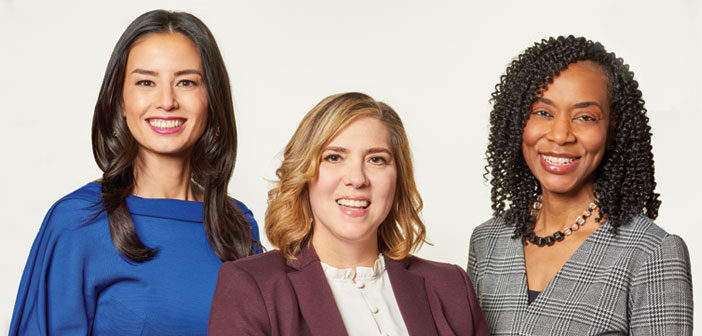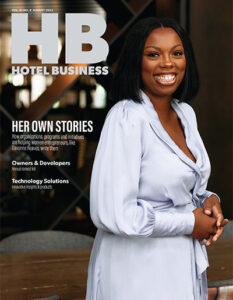One of the first times Peggy Berg, founder/chair, Castell Project, met Tracy Prigmore, founder, She Has a Deal (SHaD), the world was a very different place. The industry hadn’t been scorched by COVID, TikTok wasn’t a global phenomenon and women were much harder pressed to find programs to support their hospitality careers.
In fact, Berg even recalls not having the highest of hopes for young Prigmore.
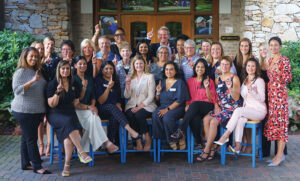
Female members of Wyndham’s franchise advisory council celebrate the first anniversary of Women Own the Room.
“One of the first times I met [Prigmore] was when she came to her very first hotel investment conference,” she said. “We were talking, and I thought, ‘This is never going to work.’”
But, Prigmore kept after it until she figured out all the steps, got her questions answered and made her first deal happen.
“That just impresses me,” Berg said. “But if you think about it, my reaction to Tracy when I met her at that conference is exactly what she faced and what each woman faces: When they go to their lender meeting, and the lender is really nice and looking at her and thinking, ‘This will never work’ in the back of their head. And, when that woman goes for equity and the equity person says, ‘This will never work.’ And, when that woman goes to a feasibility study and the feasibility analyst thinks, ‘All right, I’ll do this study, but this will never work.’ That’s what every one of us overcomes, and Tracy did it with, I think, more determination than I’ve ever seen.”
Although Prigmore plowed through the doubt to create her own success—as many women entrepreneurs have done and continue to do—the industry is a bit more receptive to female leaders now, with associations, companies and brands working to create better pathways to hotel ownership.

Tracy Prigmore (center) with the first-place winners of the 2022 She Has a Deal pitch competition: from left, Morgan Mason, Nichole Wiggins, Shanttel Liberato and Jessie Glassmire
Two of them are Castell Project, which officially became part of the AHLA Foundation in March and works to raise awareness and develops initiatives to support women in the hospitality industry, and SHaD, a competition specifically designed for women in hospitality, real estate and related fields to expose them to hotel ownership and development.
Not to mention AAHOA’s recently launched ElevateHER, an initiative aimed at elevating, educating and empowering the women hoteliers of the organization and across the industry. And, ForWard: Women Advancing Hospitality, an AHLA platform aimed at mentoring, educating and leading women to the next level of their career.
These, in tandem with a host of brand initiatives and programs, are paving the way for women, but there’s still a lot of work to be done and a lot of areas ripe for change.
“It’s not just women; it’s having all kinds of diverse voices,” Berg said. “Diverse in our beliefs, diverse in our interests and diverse in our upbringing. The more different ideas and different strengths we can build and bring into our industry and develop for our industry, the bigger the talent pool we’ll have and the better we’ll be able to connect with our guests and serve a bigger marketplace.”
There’s no question that diversity breeds innovation, especially in an industry that prides itself on global awareness and a welcoming nature, but like most things, that’s easier said than done.
“I don’t know that there are simple answers; these tend to be the kind of things that have a lot of small pieces,” Berg said. “In order to become a hotel owner, you have to have leverage and borrow and raise money. In the U.S., it wasn’t until 1988 that banks were forbidden to discriminate against women as borrowers. 1988—that’s a generation ago, but it’s not that long. Women don’t have, culturally, the experience, training and expectation that they’ll have access to debt, or that they’ve developed the idea that they can go out and ask investors for money. It’s not something that women have traditionally done. It’s a pretty significant change in mindset from the person who runs the household to somebody who goes out and says, ‘Take a risk with me; this is a good investment.’ We’re making that change, but it’s a generational change.”
If a woman hasn’t owned a hotel before, it’s very difficult to do the first one, Berg noted, but she’s noticing a lot of interest in helping women get that first deal, which segues perfectly into Prigmore’s mission.
The origins of She Has a Deal
Prigmore started SHaD when she realized that there were women interested in becoming hotel owners and developers like herself, and that there were brands interested in seeing more women become hotel owners.
“I also knew the challenges—I still face some of them,” Prigmore said. “I didn’t want women to go through the same challenges that I had—getting information, mentors, access to capital. When I heard brands were interested, I felt like I knew what the recipe for success was because I’d been through a number of those sessions they put together targeting women and minorities. I could clearly see where the missing gaps were and what they could do to close those gaps.”
Prigmore recalled the conversations with hotel brands to move forward on her plan, but she soon realized that she had to do this herself because she could clearly see everything that was needed and how it could be successful.
“It dawned on me that the people in the organizations I was talking to had never experienced it,” she said. “While they were enthusiastic and they saw a need for programs, to figure out how to implement it all would be challenging. I decided I should do it.”
So, Prigmore took it upon herself to create a pitch competition aimed at creating these pathways for women entrepreneurs.
“I wanted to ensure that education was available not by reading a book, but mentorship education…an experience they can share with you, open doors for you and tell you how things really work, and that was the kind of education I created,” she said. “I took everything I wish I knew when I started and learned along the way and created this framework to help me and my team.”
Prigmore added that finding mentors through education who can help women on their journey to hotel ownership is key, along with the networking piece to develop a peer community that’s there for them to help and support one another. Additionally, availability of capital is a pain point that still rears its ugly head.
“My vision is that there should be availability of capital for women who participate,” she said. “Capital today has too much traditional structure around who qualifies. We’re truly trying to increase the number of women who are owning and developing hotels and have to address the gender wealth gap. We’re bringing more women in who are competent but just haven’t had the financial ability or background.”
So, how does that change? Much like Berg’s view, Prigmore agrees that it’s a gradual change that’s heading in the right direction, but needs constant action from industry leaders.
“The mindset is moving,” Prigmore said. “I think over time, it’s going to naturally happen; we have seen more women get into leadership positions, and are noticing more women on the financial side of the business. Women will rise and move up, but I don’t think we want to wait for it to happen organically.”
Davonne Reaves tells her tale
One way it’s happening is by young, success-hungry women making strides. Davonne Reaves, founder/chief hospitality strategist of Atlanta-based hospitality firm The Vonne Group, is one of those visionaries.
Founded in 2017, The Vonne Group is essentially a consulting firm, offering education to help young professionals develop and own hotels. And, earlier this year, Reaves launched a crowdfunding site, Vesterr, where people can raise money to secure equity for a deal, or for people who want to invest.
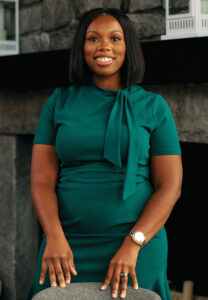
Davonne Reaves recently launched crowdfunding site Vesterr, helping minority groups gain access to capital.
“The pathway to my first hotel deal was a little different than some folks,” Reaves said. “Typically, folks either get into hotels because they dabbled in real estate and want to take it to the next level with hotel ownership, as they want to essentially have site control over this area. Or, some folks my age, they get into hotel ownership because they inherited a hotel. I wasn’t as fortunate as some of my counterparts to actually inherit a hotel. So, my pathway was different. It was harder.”
Harder, yes, because she was a female in the industry, but also a young female.
“I would say half of my counterparts who were the same age were men, and I did see the difference—the difference of exposure, the difference of camaraderie,” Reaves said. “Now, I will say that I was fortunate, and I had people in my corner to pull me aside, and I guess they saw something in me that I didn’t see, and so they wanted to help me… Some of my counterparts didn’t look like me, and I felt like they got the easier road. They got the easier tasks. I got more of the problematic tasks, and I had to overcome challenges.”
Reaves got her start as a front-desk agent at the Hyatt Regency Atlanta, and then took a nonpaid internship with Horwath HTL, which was her intro into the transactional side. From there, she moved to Boston to work for CHMWarnick. Her first deal was in 2020—a Home2Suites in El Reno, OK, in partnership with Nassau Investments.
“There’s not a guidebook on how to buy a hotel, and back then, Google wasn’t as big as it is now, and there wasn’t YouTube University or podcasts or…all of these different things that you now can do to really get the information or take courses on how to buy a hotel,” she said. “I had to figure that out on my own, and I used the knowledge and experience that I gained from working at asset management firms and advisory firms to really help me understand the hotel ownership side.”
This gave Reaves industry experience and provided relationships, yes, but also the often-overlooked power of a positive mindset.
“So many people were telling me ‘no’ that I started to believe it,” Reaves said. “It wasn’t until I had to start telling myself ‘yes’ that more people started to tell me ‘yes.’ So, you have to tell yourself ‘yes’ first before you can do it. You have to believe, ‘OK, you know what? I can actually own this hotel.’”
Reaves advises young women to start off small—maybe with a limited-service or economy hotel—and to take advantage of brand programs and resources from Castell Project and SHaD—and to also check out her crowdfunding platform to find equity for deals.
“For example, let’s say a woman is starting off [and]her goal is maybe one day to buy a full-service hotel, and she starts off with buying something smaller,” she explained. “Let’s say she just needs $1 million for the equity rate. That’s something she can raise on my platform where it makes it easier for her to access the capital and where it makes it easier for her to get the lending and what she needs to close a deal.”
As an ideal role model for aspiring women owners, Reaves can’t think of a better industry for women and diverse groups to make their mark.
“I’m well-rounded because I have friends who are from all different nationalities, so many different religions, and I don’t know if I would have been able to do that if I wouldn’t have been a part of this industry,” Reaves said. “We have so many people checking into our hotels and using our services from all different races. Our leadership should reflect that.”
Brands step up their efforts
Hotel brands have also impacted the industry in a big way, with programs and resources available to their female owners.
For Wyndham Hotels & Resorts, its Women Own the Room program targets women’s advancement in hotel ownership, born from conversations with its female members of its franchise advisory council.
“We started asking [these women]about their stories and their paths,” said Lisa Checchio, EVP/chief marketing officer, Wyndham Hotels & Resorts. “We started to recognize certain themes were emerging around financial support, operations support and the community. So, we started asking more women the same types of questions, and what we were really finding is there were real barriers for entry… Diversity, equity and inclusion is part of our DNA and has always been a core part of our values, and we really felt a responsibility to look into this further and to see what we can do.”
Women Own the Room is comprised of three key pillars: 1. delivering comprehension financial support; 2. offering personalized and complementary operational guidance and support; and 3. creating an inclusive community for networking and education.
“The hospitality industry is one of the most diverse in the world,” Checchio noted. “Almost 70% of people working in this industry are women, but only one in 10 own those hotels.”
There’s significant underrepresentation in hotel ownership, real estate and investment funding roles across the industry, but Checchio’s passion stems from hearing the actual stories from these women.
“Think about these entrepreneurs, these small business owners, these women who want to own a hotel and have been told ‘no’ time and time again, or have been asked where their husband was or their father was, who have had so many doors closed for them—to have them just tell their stories of the challenges that they faced but they never gave up and they did it all on their own is moving,” Checchio said. “We were able to create a program that showed that there was a community of these women who were doing the exact same thing that they could learn from. Representation really is a key part of this, and being able to know someone who has gone through it or to have the backing of a company like Wyndham, which really prides itself on being able to give the keys to hotel ownership to small businesses owners and entrepreneurs regardless of gender, is important. The more women I meet and the more stories I hear, [I realize] that these barriers still exist in 2022.”
For one, many women don’t know where to start and don’t have the same network that male developers do.
“It was very surprising to hear stories of women going to financial institutions and being told, ‘These are the best terms that we can do for you,’ and then having their husband go with the exact same deal for the exact same hotel and coming back and saying, ‘I can get a better rate,’” Checchio said. “Those stories are very consistently told by women across the country and across segments. These are not just new-construction deals or just conversion deals or just economy deals or just upscale deals. It’s a pretty consistent conversation that’s being had, and the financial solutions for many of these women and many of these hotel deals is the first step—being able to find that capital support and being able to understand what their options are.”
The company provides revenue management and quality and cleaning control services to its owners to ensure that once these hotels open, they are successful.
“This program has really emboldened them, giving them the confidence and the support that they needed to really make their own way,” Checchio said. “We’re seeing significant interest in this program with a dozen deals executed and preparing to open, and twice that in various stages of development and conversation—and this is a program that is less than a year old. Just the activity and the interest and having the conversations that this program has allowed us to have, I think shows the real need in our industry for these types of programs. There is a pent-up desire, passion and interest in these women wanting to own hotels, and the activity is really proving that it’s filling a gap that’s out there.”
“Women Own the Room is specifically designed to help overcome the common barriers women face in hotel development and help them effectively open and run their hotels,” said Chip Ohlsson, chief development officer, Wyndham Hotels & Resorts. “We felt we had an obligation to help foster change across the industry.
“The program has been so successful that we launched a new program for Black owners modeled off of the successes of Women Own the Room,” he said, referring to BOLD (Black Owners and Lodging Developers) by Wyndham, an initiative designed to engage and advance more Black entrepreneurs on their path to hotel ownership.
Choice Hotels is also making strides with HERtels, a dedicated program to support, connect and empower women on their journey throughout hotel ownership or to hotel ownership.
“The vision for the program and what we’ve put together right now is a more tailored process towards women’s needs and making sure we have turnkey types of solutions to help them grow and really establish across their unique journey into hospitality,” said Anna Scozzafava, VP, extended-stay brands, strategy & operations, Choice Hotels. “The three steps that we focus on are partnering, connecting and empowering.”
This includes partnering on things like lending consulting and processes; connecting on mentoring, networking and training; and then empowering and celebrating the successes of women owners and making sure that there is recognition from the industry.
“When you look at the kind of different roles within the hospitality industry—operations, revenue management, sales, finance—men and women are roughly on par in terms of representation within these kind of core roles,” Scozzafava said. “But, then you think about that and you say, ‘Well, OK, that means men and women really actually understand the business just as equally,’ but the root cause and discrepancy when it comes to ownership is much more of a cultural kind of issue and problem that we face.”
Scozzafava believes the barriers that are in place for women limit future assets like talent and performance.
“Despite that, we know that women representing our market remains under-targeted by hotel companies for ownership opportunities,” she said. “That’s where I think we come in, for HERtels particularly, and Choice’s vision and growth strategy.”
Hilton is also invested in the strategic growth of women interested in pursuing hotel ownership and provides access to educational resources, networking opportunities, ownership community support and financial guidance to enable their ability to operate and maintain a successful franchise location.
Starting in the early 2000s, Hilton hosted Hospitality 101 events for women and young professionals through industry associations—such as AAHOA and NABHOOD—that center on how to get started in ownership.
“Both women and minorities are significantly underrepresented in the hotel ownership community,” said Lisa Waldron, VP/managing director, development, Hilton. “That needs to change, not only because it’s the right thing to do, but also because that diversity of perspective empowers us to serve our guests better. As a business of people serving people, the female perspective is necessary to allow for new and diverse outlooks and offerings that will resonate with our guests, team members, owners and communities.”
Waldron recognized that securing capital is a primary pain point for women, and Hilton has worked to alleviate those concerns by educating prospective owners on how to secure the necessary financial backing, as well as providing them with the confidence needed to one day apply for that loan on their own.
“Financing is the make-or-break factor in the hotel business for first time owners,” Waldron said. “We’ve been able to provide assistance in a number of areas that not only help the dealmaker but give investors and lenders a bit more confidence that Hilton is behind this individual and the deal.”
Women are so vital to the industry, Waldron explained, as they provide a unique perspective to help fuel hospitality’s growth and innovation.
Of note, Waldron said, during the AAHOA women’s event Hilton hosted some years ago, the company noticed a trend: While the content and speakers were consistent with any other Hilton event, the questions from the female attendees varied, and the direction of the questions centered on different aspects of an issue.
“These questions spurred a deeper dive into the reasons why women faced challenges entering into ownership and a discussion of how best to empower them,” the Hilton executive said. “This is one of the reasons a female perspective is important—to explore of all sides of a question.”
According to Waldron, Hilton has a number of programs in the works and plans to continue hosting and sponsoring DEI-specific events and initiatives with Castell Project and SHaD, as well as building rapport with aspiring hotel owners to ensure they have the tools needed to secure their long-term success.
Additionally, Hilton is launching some internal ownership/development initiatives to help grow its diverse ownership base from within.
Waldron recently participated as a judge at a SHaD competition, and even as a seasoned female leader, the industry’s up-and-coming talent inspired her.
“Just listening to the conversations in the room was electrifying, and I’m excited by the thought that this talented pool of women can and will be owners one day soon,” Waldron said. “The passion and sophistication of the participants was one of the more inspiring moments of my career and made me optimistic about the role women will continue to play in the hotel industry.”
In 2016, Marina MacDonald, CMO, Red Roof started the Forum on Leadership for Women Entrepreneurs, designed to help women in hospitality develop deeper business acumen and stronger leadership skills. Additionally, this year, Matthew Hostetler, Red Roof’s chief development officer, is organizing the Women’s Center of Excellence, a program focused on development and finance.
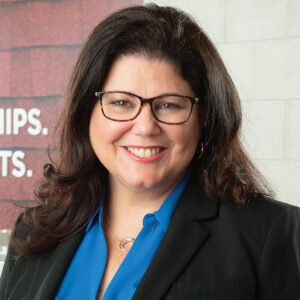
“…My passion came from being aware that women owning hotels and being in executive positions were lacking.” —Marina MacDonald, Red Roof
“I’ve been in the industry for decades and I noticed it’s been male dominated, which has been fantastic,” MacDonald said. “They’ve been mentors of mine, sponsors of mine to build my career, but my passion came from being aware that women owning hotels and being in executive positions were lacking.”
Back in 2016, women franchisees began approaching MacDonald. It began with one franchisee, then two, then three and so on, asking for a meeting.
“It began as a whisper,” MacDonald said. “They really wanted to learn more about business acumen and leadership skills. They wanted to do it in a community of other women supporting women.”
And so, the forum was born, and today it satisfies the franchisees’ need for a strong, female community.
“We set a goal that we wanted 40% of our franchisees to be women, either owning or partially owning a property,” MacDonald said. “When we started this in 2016, the number was under 20%. So, we said in five years we want to double it. We’re at 31% [and]marching toward that goal.”
Although MacDonald is proud of Red Roof’s concerted efforts, she recognizes there’s still a long way to go, which the forums expose.
“Hearing stories at last forum that the deals women were getting were either nonexistent because they weren’t being recognized or maybe a male family member would present the same information and would get a deal—that was eye-opening,” MacDonald said. “We thought we could do better by education, by developing more relationships, connections and confidence. We were all a bit stunned that this was still happening today.”
Surely, there are still mountains to climb, but the industry—and the world, for that matter—are headed in the right direction. Maybe it all begins with a whisper, an idea that incites a change, a move toward growth and, suddenly, the pathways open and the road to entrepreneurship clears.
“I realized that a lot of men who are in these executive roles have daughters and granddaughters now, so they look at things differently,” Reaves said. “The world is changing, and now their kids are challenging them, and they’re listening to their kids. They’re saying, ‘Daddy, you know, we don’t see women in corporate roles, we don’t see minorities.’ Their dads think, ‘OK, well, how can I explain this to my 10-year-old? She can be anything she wants, and I’m not showing that in my executive staff.’ So, it’s definitely changing and changing for the good. I love to see it, and I’m here for it.”

